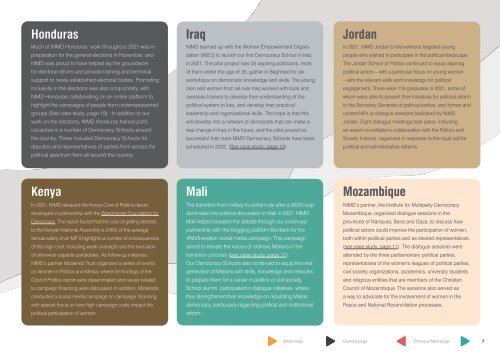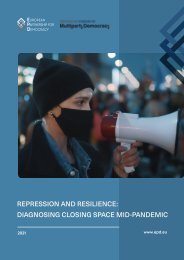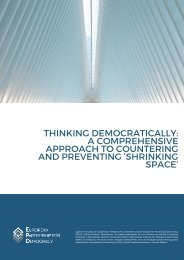NIMD Annual Report 2021
Create successful ePaper yourself
Turn your PDF publications into a flip-book with our unique Google optimized e-Paper software.
Honduras<br />
Much of <strong>NIMD</strong> Honduras’ work throughout <strong>2021</strong> was in<br />
preparation for the general elections in November, and<br />
<strong>NIMD</strong> was proud to have helped lay the groundwork<br />
for electoral reform and provide training and technical<br />
support to newly established electoral bodies. Promoting<br />
inclusivity in the elections was also a top priority, with<br />
<strong>NIMD</strong> Honduras collaborating on an online platform to<br />
highlight the campaigns of people from underrepresented<br />
groups (See case study, page 19). In addition to our<br />
work on the elections, <strong>NIMD</strong> Honduras trained political<br />
actors in a number of Democracy Schools around<br />
the country. These included Democracy Schools for<br />
deputies and representatives of parties from across the<br />
political spectrum from all around the country.<br />
Iraq<br />
<strong>NIMD</strong> teamed up with the Women Empowerment Organization<br />
(WEO) to launch our first Democracy School in Iraq<br />
in <strong>2021</strong>. The pilot project saw 25 aspiring politicians, most<br />
of them under the age of 35, gather in Baghdad for six<br />
workshops on democratic knowledge and skills. The young<br />
men and women from all over Iraq worked with local and<br />
overseas trainers to develop their understanding of the<br />
political system in Iraq, and develop their practical<br />
leadership and organizational skills. The hope is that this<br />
will develop into a network of democrats that can make a<br />
real change in Iraq in the future, and the pilot proved so<br />
successful that more <strong>NIMD</strong> Democracy Schools have been<br />
scheduled in 2022. (See case study: page 13)<br />
Jordan<br />
In <strong>2021</strong>, <strong>NIMD</strong> Jordan’s interventions targeted young<br />
people who wished to participate in the political landscape.<br />
The Jordan School of Politics continued to equip aspiring<br />
political actors – with a particular focus on young women<br />
– with the relevant skills and knowledge for political<br />
engagement. There were 118 graduates in <strong>2021</strong>, some of<br />
whom were able to present their initiatives for political reform<br />
to the Secretary Generals of political parties, and former and<br />
current MPs at dialogue sessions facilitated by <strong>NIMD</strong><br />
Jordan. Eight dialogue meetings took place, including<br />
an expert roundtable in collaboration with the Politics and<br />
Society Institute, organized in response to the royal call for<br />
political and administrative reforms.<br />
Kenya<br />
In <strong>2021</strong>, <strong>NIMD</strong> released the Kenya Cost of Politics report,<br />
developed in partnership with the Westminster Foundation for<br />
Democracy. The report found that the cost of getting elected<br />
to the Kenyan National Assembly is 245% of the average<br />
annual salary of an MP. It highlights a number of consequences<br />
of this high cost, including weak oversight and the exclusion<br />
of otherwise capable candidates. As follow-up initiatives,<br />
<strong>NIMD</strong>’s partner Mzalendo Trust organized a series of events<br />
on Women in Politics and Media, where the findings of the<br />
Cost of Politics report were disseminated and issues related<br />
to campaign financing were discussed. In addition, Mzalendo<br />
conducted a social media campaign on campaign financing,<br />
with special focus on how high campaign costs impact the<br />
political participation of women.<br />
Mali<br />
The transition from military to civilian rule after a 2020 coup<br />
dominated the political discussion in Mali in <strong>2021</strong>. <strong>NIMD</strong><br />
Mali helped broaden the debate through our continued<br />
partnership with the blogging platform Benbere for the<br />
#MaTransition social media campaign. This campaign<br />
aimed to elevate the voices of ordinary Malians in the<br />
transition process (see case study, page 17).<br />
Our Democracy Schools also continued to equip the next<br />
generation of Malians with skills, knowledge and networks<br />
to prepare them for a career in politics or civil society.<br />
School alumni participated in dialogue initiatives, where<br />
they strengthened their knowledge on rebuilding Malian<br />
democracy, particularly regarding political and institutional<br />
reform.<br />
Mozambique<br />
<strong>NIMD</strong>’s partner, the Institute for Multiparty Democracy<br />
Mozambique, organized dialogue sessions in the<br />
provinces of Nampula, Beira and Gaza, to discuss how<br />
political actors could improve the participation of women,<br />
both within political parties and as elected representatives.<br />
(see case study, page 11). The dialogue sessions were<br />
attended by the three parliamentary political parties,<br />
representatives of the women's leagues of political parties,<br />
civil society organizations, academics, university students<br />
and religious entities that are members of the Christian<br />
Council of Mozambique. The sessions also served as<br />
a way to advocate for the involvement of women in the<br />
Peace and National Reconciliation processes.<br />
World map<br />
Content page<br />
Previous/Next page<br />
7

















